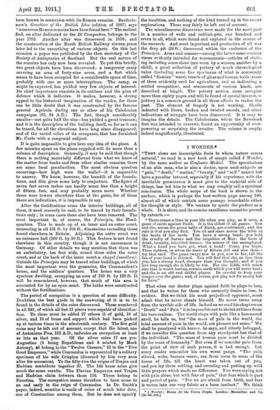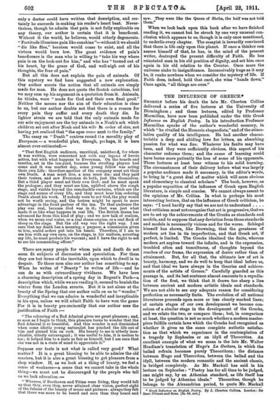I WONDER.*
"THEY alone are incorrigible fools to whom nature conies natural," we read in a new book of essays called I Wonder, by the same author as Confessio Medici. The speculations of an able man, who is also a doctor, upon such subjects as "pain," "death," " matter," "beauty," and "self " cannot but have a peculiar interest, especially if his experience, with the inevitable prominence it must give to the material side of things, has led him to what we may roughly call a spiritual
conclusion. The whole scope of the book is shown in the preface, which is perhaps the best-written page among 109, almost all of which contain some passage remarkable either for thought or style. We venture to quote the preface as a whole. It is short, and its concise excellence cannot be proved by extracts :—
" There comes a time in your life when you play, as it were, a game of cards against Faith. It is the oldest of all games. You and she, across the green table of Earth, are confronted ; and the rule is that you play first. You sit and stare across the table at the backs of her cards. You have a strong hand: you hold the cruelty of Nature and the iniquities of Man: the facts of drink, insanity, inherited disease : the misery of the unemployed. What a hand you have got, what a hand ! Come, you begin. Those eighteen, on whom the tower of Siloam fell and slew them— try that card. The game sways now to you, now to her, till the fan of your hand is thinned. You will find that she, no less than you, has a strong hand, stronger than you thought ; and if you live long enough she is likely to win. For she holds, with much else that is worth having, certain cards which you will never beat; and she is an old and skilful player. Be careful to keep your temper over the game; and, of course, you play not for money but for Love."
That when our doctor plays against faith he plays to lose, and that he writes for those who earnestly desire to lose, is evident. But we think his most prejudiced opponent-must admit that he never cheats himself. He never turns away from the terrible side of life. Indeed as we read his chapters on "Death" and "Pain" it is impossible not to shrink attimes from his bare realism. The world rings with pain like a hammered
anvil, he tells us, but "the mass of pain in the world, the total amount of pain in the world, are phrases not sums." We shall be paralysed with horror, he says, and utterly befogged, if we consider this question from any standpoint but that of the individual. "The mass of human pain must be divided by the mass of humanity." But even if we consider pain from
the point of view of each person, it is bad enough. Let every reader remember his own worst pangs. "The pain stirred, woke, became worse, ran from room to room of the house of life, till the heart was taken out of you, and you lay there sobbing and sweating and putting up wild little prayers which made no difference. You were crying not with pain alone, but with fear of pain," that fear which is part and parcel of pain. "For we are afraid from birth, and fear is woven into our very fabric as a born instinct." We think
• I Wonder: Essays for the Young People. London : Macmillan and Co. [3s. 6d. net.]
only a doctor could have written that description, and cer- tainly he succeeds in making his reader's heart beat. Never- theless, though he admits that pain is not fully explicable on any theory, our author is certain that it is beneficent. Without it the world, he believes, would utterly degenerate. " Fortitude illumines pain like sunshine "—without it we should " die like flies," heroism would cease to exist, and all the virtues would burn low. The great evidence of pain's beneficence is the man who is willing to "take his way where pain is on the look-out for him," and who has " turned out of his heart, by the grace of God, and well-nigh out of his thoughts, the fear of pain."
But all this does not explain the pain of animals. Of this mystery we find here suggested a new explanation. Our author scouts the notion that all animals are simply made for man. He does not quote the Scotch catechism, but we may sum up his argument in a quotation from it. Animals, he thinks, were " made for God and their own final good." Neither the means nor the aim of their education is clear to us, but our author doubts not that there is a reason for every pain they suffer and every death they die. In lighter strain we are told that the only animals made for our sole enjoyment are the toy animals in a Noah's ark which children set out after Noah and his wife in order of size, not having yet realised that " the apes come next to the family."
The essay on " Death" centres round tie morality play of _Everyman — a wonderful play, though, perhaps, it is here almost over-estimated:
"That first English audience, uncritical, unlettered, for whom it was written, were concerned not with any legend of heroic action, but with what happens to Everyman. On the boards and trestles, set in the inn-yard, because the strolling players had come and it was market day, some young fellow was acting their own Life : therefore another of the company must act their own Death. A man must live, a man must die : and they paid their testers, and saw Everyman do both, just like themselves. But a third player must act their own God ; and he must speak the prologue ; and they must see him, uplifted above the rough stage, and visible beyond the ramshackle curtains, which are the stage and scenes of every life, and they must hear him ordering Death about his work. If nobody were to act God, the play would not be worth seeing, and the testers might be spent to more advantage in the front parlour of the inn. To that audience the play was real, because God was in it; that was just what made it so like what happens in real life. The British drama has advanced far from this kind of play ; and we now talk of realism, when we mean real water, or a real steam-engine, or a real flock of sheep on the stage. But the old way was the right way. I am sure that my death has a meaning, a purpose, a commission given to him, sealed orders put into his hands. Therefore, if I am to see him with my own eyes, on the stage, in his uniform, arresting my life, he must produce his warrant; and I have the right to ask to see his commanding officer."
There are many people for whom pain and death do not seem fit subjects of discussion and speculation. For them they are but items of the inevitable, upon which to dwell is to
despair. To these men also our author has something to say. When he writes of " Beauty " he writes of life — and he can do so with extraordinary vividness. We have here a charming description of a spring day in Regent's Park—a description which, while we are reading it, seemed to banish the winter from the London streets. But it is not alone at the beauty of the Spring that our author calls on us to " wonder." Everything that we can admire is wonderful and inexplicable in his eyes, unless we will admit Faith to have won the game For it is in beauty pre-eminently that our author sees the justification of Faith
" The colouring of a Red Admiral gives me great pleasure ; and, so soon as I begin to think, this pleasure turns to wonder that the Red Admiral is so beautiful. And this wonder is not diminished when some idiotic young naturalist has pinched the life out of him and pinned him on cork. His beauty to me is utterly inex- plicable, utterly extravagant ; it was useful to him, it is useless to me ; it helped him to a mate as fair as himself, but I am sure that she was not in a state of mind to appreciate it."
Suppose our taste is not what is called very good ? What matter ? It is a great blessing to be able to admire the old masters, but it is also a great blessing to get pleasure from a
shop window. If, as we look at a thing of beauty, we feel a sense of weakness—a sense that we cannot take in the whole thing—we must not be discouraged by the people who tell us we lack education
" Whereas, if Beethoven and Titian were living, they would tell us that they, even they, never attained clear vision, perfect sight of the fulness of the beauty of music and pictures : always they felt that there was more to be heard and seen than they heard and
saw. They were like the Queen of Sheba, the half was not told them."
When we look back upon this book after we have finished reading it, we cannot but be struck by one very unusual con- clusion which appears to us, though it is only once mentioned, to underlie every chapter. The essayist is inwardly convinced that there is life only upon this planet. If once a thinker can assure himself of that, he has, in the mind of the present writer, destroyed the present difficulty of Faith. He has reinstated man in his old position of dignity, and set him once again in his old relation to the Creator. Once more the universe sinks to insignificance. Inconceivably huge as it may be, it ranks nowhere when we consider the mystery of life. If Faith does, indeed, hold that card, she wins "bands down." Once again, "all things are ours."







































 Previous page
Previous page